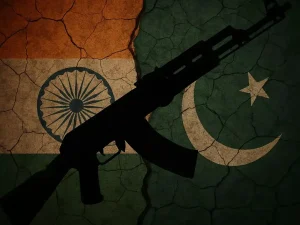New Delhi: In a rapidly evolving geopolitical scenario, India’s execution of “Operation Sindoor” — a series of targeted military strikes on terror camps across Pakistan and Pakistan-administered Kashmir — has drawn strong reactions from global powers. The India-Pakistan military strikes come in response to a brutal terror attack in Pahalgam last month that claimed the lives of dozens of Indian tourists. With both India and Pakistan being nuclear-armed nations, the world is now watching with heightened concern and urgency.
India’s Position on India-Pakistan Military Strikes
India has maintained that Operation Sindoor was a preemptive and proportionate response to repeated terror threats emanating from across the border. Indian officials emphasized that the targets were non-civilian and focused strictly on locations linked with known terror outfits operating in Pakistan-administered regions. The strikes, according to India’s Ministry of External Affairs, were carried out to ensure national security, uphold territorial sovereignty, and eliminate threats before they materialized again.
Prime Minister Narendra Modi addressed the nation, assuring citizens that India stands united and strong in the face of terrorism. He reiterated that “India will not tolerate attacks on innocent civilians and will respond with resolve when provoked.”
Pakistan’s Response: Vows Retaliation, Seeks International Support
Pakistan, however, has sharply condemned the Indian strikes, calling them an act of aggression and a violation of its sovereignty. The Pakistan military has vowed to respond “at the time and place of its choosing,” while Prime Minister Shehbaz Sharif reached out to the United Nations and OIC (Organisation of Islamic Cooperation), seeking international condemnation of India’s actions. Pakistan has also issued a full military alert across border regions.
International Reactions: Appeals for De-escalation and Diplomacy
United Nations (UN)
UN Secretary-General António Guterres voiced “deep concern” over the military escalation and called upon both sides to exercise “maximum restraint.” The UN urged India and Pakistan to return to dialogue and diplomacy, emphasizing that a peaceful resolution is the only sustainable path forward.
United States
The U.S. State Department, through spokesperson Matthew Miller, stated:
“The United States is closely monitoring the situation. We urge both India and Pakistan to avoid further military action and engage in direct communication to de-escalate the crisis.”
While recognizing India’s right to self-defense, Washington highlighted the potential danger of miscalculation between nuclear powers and advocated for immediate bilateral talks.
United Kingdom
UK Prime Minister Sir Keir Starmer expressed concern and called on both sides to maintain peace.
“We are deeply worried about the recent developments in South Asia. We call upon both New Delhi and Islamabad to prioritize dialogue over conflict.”
The British Foreign Office also updated its travel advisories for citizens traveling to the subcontinent, particularly near the Line of Control.
China
China’s Foreign Ministry issued a carefully worded statement, urging both India and Pakistan to maintain regional stability.
“Peace in South Asia is in the interest of all nations. We encourage both countries to handle the matter with prudence and to avoid actions that may further escalate tensions.”
China, a traditional ally of Pakistan, has also offered to facilitate dialogue between the two nations if required.
Russia
Russia called for calm and non-interference, offering to mediate the conflict.
“As a long-standing friend to both countries, Russia is ready to provide any assistance required to bring the situation under control,” stated Foreign Minister Sergey Lavrov.
Israel
Israel’s ambassador to India, Reuven Azar, showed strong support for India, citing its sovereign right to eliminate terror threats.
“We support India’s right to protect its citizens. There can be no safe havens for terrorists.”
United Arab Emirates
The UAE, which has growing diplomatic ties with both nations, issued a neutral statement:
“We urge immediate de-escalation and open diplomatic channels. The region’s peace and economic progress must not be compromised by armed conflict.”
Strategic Implications: Global Stakes in a South Asian Conflict
The international community is especially concerned due to the historical volatility of Indo-Pak conflicts and the nuclear capabilities both countries possess. A military escalation could destabilize the region’s economy, disrupt trade routes, affect oil markets, and displace millions. Global leaders are also worried about the humanitarian implications if the confrontation continues.
Beyond security, many nations are also considering the broader impact on multilateral partnerships and economic agreements, especially with India emerging as a key global economic player and strategic partner to Western powers.
Conclusion
 As the world appeals for calm, both India and Pakistan now face intense diplomatic scrutiny. The path forward remains unclear, but what’s certain is that the stakes — regional and global — are too high for missteps. The pressure is now on international institutions and allied nations to broker peace, facilitate communication, and ensure that reason prevails over retaliation.
As the world appeals for calm, both India and Pakistan now face intense diplomatic scrutiny. The path forward remains unclear, but what’s certain is that the stakes — regional and global — are too high for missteps. The pressure is now on international institutions and allied nations to broker peace, facilitate communication, and ensure that reason prevails over retaliation.
For official updates and statements, visit the Ministry of External Affairs – Government of India.

